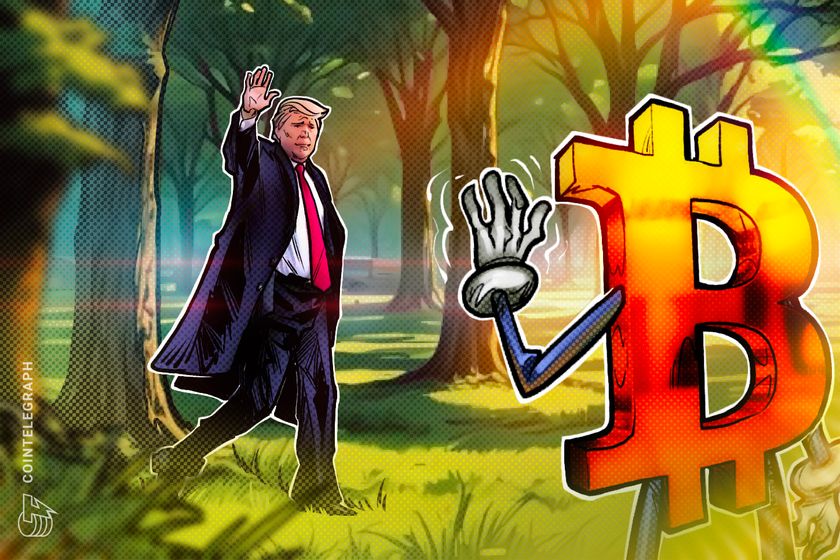
What do Bitcoin ecosystem CEOs make of ordinals, and what does the computer game Doom have to do with it?
Ordinals are here to stay. Ordinals, or the ability to permanently ink the Bitcoin (BTC) blockchain with data, typically in the format of a picture or jpeg, are a controversial topic among some members of the Bitcoin and wider crypto community. Not so for the builders and the CEOs of Bitcoin-focused companies who were present at the Bitcoin conference, Advancing Bitcoin in London.
Cointelegraph asked several CEOs, builders and key opinion leaders for their views on ordinals throughout the conference. The overarching sentiment was that of curiosity, indifference or deference.
Alex Leishman, CEO of River, told Cointelegraph that he doesn’t have a stance on ordinals just yet, but has recently been gifted an ordinal.
"In the abstract, the idea of having this sort of like meta-layer on top of Bitcoin that tracks Sats; that has a separate state or mapping onto the blockchain is really fascinating and could potentially be interesting for other things."
For example, Leishman recently played the vintage computer game Doom on an ordinal. “Someone had embedded doom in JavaScript and in a small web page in an ordinal,” which Leishman loaded up from the blockchain.

Eric Sirion, cofounder and advisor to Fedi, and maintainer of the open source protocol Fedimint told Cointelegraph that he’s also “pretty neutral” on Ordinals.
“Essentially, we cannot do anything about it in a way that is morally consistent. Like if we try to fight it, what gives us the right to do that? And also, we cannot effectively fight it. […] So yeah, why get worked up about it?”
Sirion added that he’s not necessarily a fan of Ordinals as it might blow up the blockchain a bit, but “Who am I to tell other people what to do with the fees they pay like?”
The Bitcoin blockchain has since “bloated,” reaching an average block size all time high, but fees have remained more or less consistent.

Benoit Mazouk, CEO of UK based Bitcoin exchange, Bitcoinpoint, shared Sirion’s concerns about blockchain congestion. He explained that while he understands that Bitcoin key opinion leaders, such as CEO of Blocksstream Dr Adam Back, who commented that ordinals are “useless” (insert tweet), for Mazouk, he’s “more into Bitcoin as a currency.”
"you can't stop them" well ofc! bitcoin is designed to be censor resistant. doesn't stop us mildly commenting on the sheer waste and stupidity of an encoding. at least do something efficient. otherwise it's another proof of consumption of block-space thingy.
— Adam Back (@adam3us) January 29, 2023
Perhaps a greater concern is that users can upload graphic images and offensive data onto the blockchain. Recently, shock porn was uploaded as an Ordinal.
However, the permanence and censorship resistance works both ways: Leishman states that creating permanent records for potentially important or culturally significant events and dats–such as Doom–can be permanently etched into the blockchain. “Ordinals can eventually become composable and it's really truly censorship resistant content,” Leishman commented.
Related: Yuga Labs’ first Bitcoin NFT auction nets $16.5M in 24 hours
Christian Keroles, managing director at Bitcoin Magazine, recently posted a culturally topical reference to the censuring of Roahl Dahl books. CK queried where the minting of books on the blockchain would preserve original copies.
Maybe banned books are worth inscribing to Bitcoin ♀️ https://t.co/WXpDYk4rzs
— ck (going to Bitcoin 2023) (@ck_SNARKs) February 28, 2023
In all, Ordinals are beginning to change the way Bitcoin advocates use and approach Bitcoin. Ordinals offer another use case to the Bitcoin network over its first one: peer-to-peer cash.
“Maybe the Bitcoin database has value for other things, and they're willing to pay for it, which is good for miners and maybe is what actually.”
Miners have earned more revenue per block since Ordinals’ introduction, while video gaming fans can rest assured that Doom is playable, loaded from the Bitcoin blockchain.























